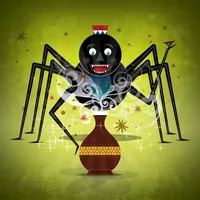Anansi i Wiedza
Anansi||Wissen
Anansi and Knowledge||Knowledge
Анансі||Знання
Anansi und das Wissen
Anansi and Wisdom
Anansi en kennis
Anansi e o conhecimento
Ананси и знание
Анансі та знання
阿纳西与知识
Dawno, dawno temu ludzie nic nie wiedzieli.
Long ago|Long ago|long ago|people|||knew
|давно|||нічого||
Vor langer Zeit wussten die Menschen nichts.
Long long ago people didn’t know anything.
Колись люди нічого не знали.
Nie potrafili uprawiać roślin, tkać tkanin, ani wytwarzać narzędzi żelaznych.
|||Pflanzen||Stoffe||herstellen||eisenernen
|could not|cultivate|plants|weave|fabrics|nor|produce|tools|iron tools
|вміли|вирощувати|рослин|тка́ти|тканини||випускати|інструменти|залізних
They didn’t know how to plant crops, or how to weave cloth, or how to make iron tools.
Вони не вміли вирощувати зернові, ткати полотно чи виготовляти залізні знаряддя праці.
Bóg Nyame wysoko w niebie posiadał wiedzę całego świata.
|||||besaß|||
God|God Nyame|high up||heaven|possessed|knowledge|entire|world
Бог|Ньяме|високо|||мав|знання||
Der Gott Nyame hoch oben im Himmel besaß das Wissen um die ganze Welt.
The god Nyame up in the sky had all the wisdom of the world.
Бог Ньяме високо на небі володів знанням усього світу.
Przechowywał ją bezpiecznie w glinianym kociołku.
Bewahrte auf||sicher||tonernen|
Stored|her|safely||clay|clay pot
зберігав|її|||глиняному|
Er bewahrte es sicher in einem Tonkessel auf.
He kept it safe in a clay pot.
Він надійно зберігав його в глиняному казані.
Pewnego dnia Nyame zdecydował, że odda swój kociołek wiedzy Anansi'owi.
|||||||Kessel||
One|one day|Nyame|decided||give away|his|cauldron|knowledge|to Anansi
|||вирішив||віддасть||котелок|знання|Анансі
Eines Tages beschloss Nyame, Anansi seinen Kessel des Wissens zu geben.
One day, Nyame decided that he would give the pot of wisdom to Anansi.
Za każdym razem, gdy Anansi zaglądał do kociołka, uczył się czegoś nowego.
Each time|each|each time||Anansi|peeked into||pot|learned||something new|something new
|||коли||заглядав||казанка|учився||чогось|
Every time Anansi looked in the clay pot, he learned something new.
Щоразу, коли Анансі заглядав у казан, він дізнавався щось нове.
Było to bardzo ekscytujące!
|||aufregend
|||exciting
було||дуже|експериментально
It was so exciting!
Chciwy Anansi pomyślał: „Schowam kociołek na czubku wysokiego drzewa.
gierige|||Ich werde verstecken|||||
Greedy|Greedy Anansi|thought|hide|pot||treetop|tall|trees
Жадібний||подумав|сховаю|||вершині|високого|
Der gierige Anansi dachte: "Ich werde den Kessel in der Spitze eines hohen Baumes verstecken.
Greedy Anansi thought, “I’ll keep the pot safe at the top of a tall tree.
Жадібний Анансі подумав: "Я сховаю казан на верхівці високого дерева.
Wtedy będę miał go tylko dla siebie!” Uprządł długą nić, obwiązał nią kociołek i przywiązał go do swojego brzucha.
|||||||spannte|||||||band festgebunden||||
"Then"||"will have"||"only"||myself|Spun|long|thread|tied with|it|little pot||tied||||belly
|буду|матиму||тільки||себе|Упрядла||нитку|обв'язав|нею|||прив'язав||||живота
Dann habe ich ihn ganz für mich allein!" Er spannte einen langen Faden, band den Kessel darum und band ihn an seinen Bauch.
Then I can have it all to myself!” He spun a long thread, wound it round the clay pot, and tied it to his stomach.
Тоді вона буде вся моя!" Він запряг довгу нитку, обв'язав нею казан і прив'язав його до свого живота.
Anansi zaczął wspinać się na drzewo, ale nie była to łatwa wspinaczka bo kociołek ciągle uderzał go w kolana.
|||||||||||Kletterei||||schlug gegen|||
Anansi|began|climb up|||tree|||||easy|climb|because|pot|constantly|hit|began to||knees
||в climbing||||||||легка|висхід|бо||постійно|ударяв|||коліна
He began to climb the tree. But it was hard climbing the tree with the pot bumping him in the knees all the time.
Przez cały czas, synek Anansi'ego stał pod drzewem i obserwował swojego ojca.
Throughout|the whole|all the time|son|Anansi's son|stood|under|tree||watched|his own|father
протягом||час||Анансі|стояв|під|||спостерігав||батька
All the time Anansi’s young son had been standing at the bottom of the tree watching.
Весь цей час син Анансі стояв під деревом і спостерігав за батьком.
Nagle powiedział: „Czy nie byłoby Ci łatwiej wspiąć się na drzewo, gdybyś przywiązał kociołek do swoich pleców?” Anansi przywiązał kociołek do pleców i faktycznie wspinaczka stała się dużo łatwiejsza.
plötzlich|||||||hinaufklettern|||||||||||||||||Klettern||||
Nagle said|said|Wouldn't it||would be|you|easier|climb up|||tree|if you|tied|pot||your|back|Anansi|tied|pot||back||in fact|climbing|became||much|easier
раптом||чи||було б||легше|взобратися|||дерево|якщо ти|прив'язав||||спини||прив'язав|||спини||фактично||стала|||легшою
He said, “Wouldn’t it be easier to climb if you tied the pot to your back instead?” Anansi tried tying the clay pot full of wisdom to his back, and it really was a lot easier.
Bardzo szybko dotarł na czubek drzewa.
||er ist angekommen|||
|very quickly|reached||top|tree
||дотягнувся||верхівка|
In no time he reached the top of the tree.
Nagle zatrzymał się i pomyślał: „To ja powinienem być tym, który posiada całą mądrość, a to mój syn okazał się mądrzejszy ode mnie!” Anansi rozzłościł się tak bardzo, że zrzucił kociołek z drzewa.
||||||||||||||||||ist||||||||||||||Baum
Suddenly|stopped|||thought to himself|||should|be|the one||possesses|all the|wisdom||||son|turned out||wiser than me|than me||Anansi|got angry|||||he dropped|cauldron||tree
||||||||||||||||||||mais sábio||||||||||||
раптом|||||||повинен||тим|який|володіє|всю|мудрість||||син|виявився||мудрішим|ніж|||розлютився|||так||скинув|||
Plötzlich hielt er inne und dachte: "Ich sollte derjenige sein, der all die Weisheit besitzt, und es stellte sich heraus, dass mein Sohn klüger war als ich!" Anansi wurde so wütend, dass er den Kessel vom Baum warf.
But then he stopped and thought, “I’m supposed to be the one with all the wisdom, and here my son was cleverer than me!” Anansi was so angry about this that he threw the clay pot down out of the tree.
Раптом він зупинився і подумав: "Я мав би бути тим, хто володіє всією мудрістю, а мій син виявився розумнішим за мене!" Анансі так розлютився, що скинув казан з дерева.
Kociołek wiedzy uderzył o ziemię i rozbił się na kawałki.
Cauldron|knowledge|struck||ground||smashed|||pieces
||ударив||землю||розбився|||куски
It smashed into pieces on the ground.
Wiedza stała się dostępna dla wszystkich i wszyscy mogli się nią teraz dzielić.
||||||||||||teilen
Knowledge|became||available||everyone||everyone|could||it|now|share
|||доступною|||||||||ділитися
The wisdom was free for everyone to share.
I właśnie w ten sposób ludzie nauczyli się jak uprawiać ziemię, tkać tkaniny, wytwarzać narzędzia żelazne oraz wielu innych zajęć, które ludzie wiedzą jak wykonywać.
|gerade||||||||||weben|||||||||||||ausführen
|"just"||this way|way|people|learned|||cultivate|land|weave|fabrics|produce|tools|iron tools|and|many other activities|other|activities||people|know how to||perform
||||||||||||тканини||інструменти|залізні|та|||занять|||||
So lernten die Menschen, das Land zu bestellen, Stoffe zu weben, Werkzeuge aus Eisen herzustellen und viele andere Tätigkeiten, die die Menschen beherrschen.
And that is how people learned to farm, to weave cloth, to make iron tools, and all the other things that people know how to do.

